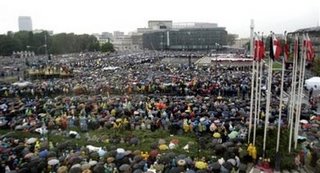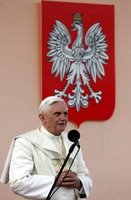
From the Vatican website...
 Decatur, AL...interesting story of the procedure one goes through to receive such an honor...that also involves praying at the tomb of Pope John Paul II. Yet the reason I'm posting it is more because of the picture which is the first incident where I've seen the pope pictured giving someone Holy Communion in the hand:
Decatur, AL...interesting story of the procedure one goes through to receive such an honor...that also involves praying at the tomb of Pope John Paul II. Yet the reason I'm posting it is more because of the picture which is the first incident where I've seen the pope pictured giving someone Holy Communion in the hand:
What started out as scholarship with an openly feminist political agenda
has evolved into serious and respected inquiry. To understand this change,
consider what has happened to the field during the career of Bernadette Brooten.
As a graduate theology student at Harvard in the late 1970s, Brooten was told
that scholars already knew everything there was to know about women in the
Bible. Yet Brooten, now a professor of Christian studies at Brandeis University,
made the remarkable discovery by reading older versions of the Bible that
Junius, one of the many Christian “Apostles” mentioned by Saint Paul, was in
fact a woman, Junia, whose name was masculinized over the centuries by
translators with their own agenda. Brooten’s discovery became “official” when
Junia’s real name was incorporated into the New Standard Revised Version of the
Bible, which came out in 1989.
It's AD 2006, and the peasants are much brighter than they used to be. So this question nags at me: Is it really in keeping with the worshipful spirit in an enlightened age that a priest would chastise some in the flock — grown men and women — for kneeling in church during a point in the Mass?
I mean, if you can't kneel in church….
The word "chastise" is too tame; the priest at St. Mary's by the Sea says it's a mortal sin and has invited 55 offending members to leave the church.
They have declined, although I can't imagine why.
As reported in Sunday's paper by The Times' David Haldane, the to-kneel-or-not-to-kneel issue involves a particular moment in the Mass after the priest holds up the chalice and consecrated bread and invokes Christ. For centuries, Roman Catholics knelt after that part of the liturgy. In recent years, however, the Vatican allowed local dioceses to eschew kneeling, and the Orange County diocese has backed the no-kneeling rule during that part of the Mass. Parishioners still kneel during other parts of the service.

To speak in this place of horror, in this place where unprecedented mass crimes were committed against God and man, is almost impossible - and it is particularly difficult and troubling for a Christian, for a Pope from Germany. In a place like this, words fail; in the end, there can only be a dread silence - a silence which is itself a heartfelt cry to God: Why, Lord, did you remain silent? How could you tolerate all this? In silence, then, we bow our heads before the endless line of those who suffered and were put to death here; yet our silence becomes in turn a plea for forgiveness and reconciliation, a plea to the living God never to let this happen again.

How can we not thank God today for all that was accomplished in your native land and in the whole world during the Pontificate of John Paul II? Before our eyes, changes occurred in entire political, economic and social systems. People in various countries regained their freedom and their sense of dignity. “Let us not forget the great works of God” (cf. Ps 78:7). I thank you too for your presence and for your prayer.
As in past centuries, so also today there are people or groups who obscure this centuries-old Tradition, seeking to falsify the Word of Christ and to remove from the Gospel those truths which in their view are too uncomfortable for modern man. They try to give the impression that everything is relative: even the truths of faith would depend on the historical situation and on human evaluation. Yet the Church cannot silence the Spirit of Truth. The successors of the Apostles, together with the Pope, are responsible for the truth of the Gospel, and all Christians are called to share in this responsibility, accepting its authoritative indications. Every Christian is bound to confront his own convictions continually with the teachings of the Gospel and of the Church’s Tradition in the effort to remain faithful to the word of Christ, even when it is demanding and, humanly speaking, hard to understand. We must not yield to the temptation of relativism or of a subjectivist and selective interpretation of Sacred Scripture. Only the whole truth can open us to adherence to Christ, dead and risen for our salvation.
Christ says: “If you love me ... ” Faith does not just mean accepting a certain number of abstract truths about the mysteries of God, of man, of life and death, of future realities. Faith consists in an intimate relationship with Christ, a relationship based on love of him who loved us first (cf. 1 Jn 4:11), even to the total offering of himself. “God shows his love for us in that while we were yet sinners Christ died for us” (Rom 5:8). What other response can we give to a love so great, if not that of a heart that is open and ready to love? But what does it mean to love Christ? It means trusting him even in times of trial, following him faithfully even on the Via Crucis, in the hope that soon the morning of the Resurrection will come. Entrusting ourselves to Christ, we lose nothing, we gain everything. In his hands our life acquires its true meaning. Love for Christ expresses itself in the will to harmonize our own life with the thoughts and sentiments of his Heart. This is achieved through interior union based on the grace of the Sacraments, strengthened by continuous prayer, praise, thanksgiving and penance.

So with these thoughts I have been working on my own funeral. I have my
casket picked out. You can find it at TrappistCaskets. I am going for a simple oak casket in the traditional shape rather thant he rectangular one. I am getting all the legal documents ready. I am going to prepare a letter or a video for my family. Finally I am going to prepare my liturgy in advance.
I am going to be working with my parishioners to encouarage them to think about these things as well. Here are some of the things I want to encourage them to
have.
1. A durable power of attorney (this is much better than a living will
because you can't handle ever situation with a living will. It is better to have
someone you trust to make the decisions. I will put up a sample form later of
this for download.)
2. A will (Again the state can do all sorts of weird things with your estate if you don't leave a will. It saves the family a lot of pain and suffering if this document is carefully prepared and in place)
3. A Codice to the will expressing your desires for your funeral.
4. A funeral liturgy plan ( this should be worked out in conjunction with your priest and kept on file at the parish. If your priest changes then you should review it
with your new pastor. It is important that you don't leave this step out because
you don't want to plan stuff the priest can't do or that isn't in accordance with the liturgy. If someone presented me with one of these that I hadn't seen I would try to honor it as much as possible but if I couldn't then I would have to delcline parts of it. It also is a beautiful way to speak to your family one last time through your selection of the funeral readings.)

Upon his arrival in Warsaw, pope Benedict XVI expressed his joy of being in the homeland of late John Paul II. The pontiff stressed that he came to Poland
to walk the routes of his predecessor. During this visit Benedict XVI would like
to meet and get to know the generation of John Paul II as well as all the generations which grew up under the spiritual care of the Polish-born pope who died in April last year. President Lech Kaczynski responded to the motto of the pope’s visit by declaring that Poles are willing to be strong in the faith and that their hearts are open to the message of Benedict the XVI. Later this afternoon president Kaczynski will receive the pope.

Asked by journalists on the plane how he felt about visiting Auschwitz as a German, Benedict said, ``I am above all a Catholic. I must say that this is the most important point.''
"Of notable importance are your catechists," he added, "Teaching the faith cannot be reduced to a mere transmission of 'things' or words or even a body of abstract truths. The Church's Tradition is alive!" On this subject to Holy Father particularly appealed to "the young adults of your dioceses to take up the rewarding challenge of catechetical service and share in the satisfaction of handing on the faith. Their example of Christian witness to those younger than themselves will strengthen their own faith, while bringing to others the happiness that flows from the sense of purpose and meaning in life which the Lord reveals."
Benedict XVI also noted how, in their program of pastoral renewal, the prelates are "facing the delicate task of reorganizing parishes within dioceses," which "is essentially an exercise of spiritual renewal, and calls for the pastoral promotion of sanctity." This, he added, may be achieved by "an authentic education in prayer, a knowledge of the lives of the saints and of the multiple forms of spirituality that beautify and stimulate Church life, assiduous participation in the Sacrament of Penance, and a convincing catechesis of Sunday as 'day of the faith'."